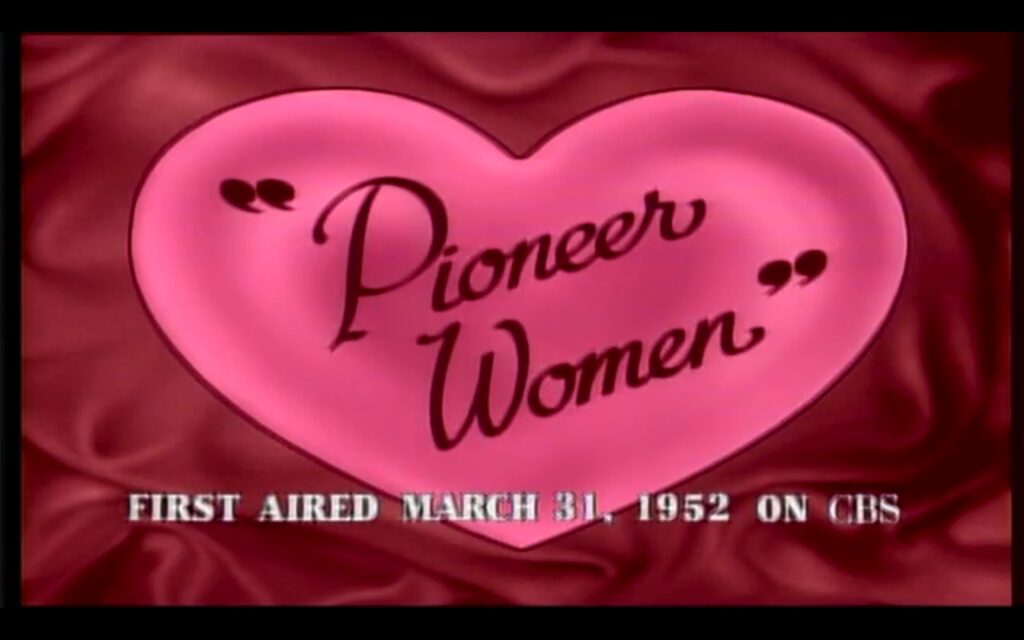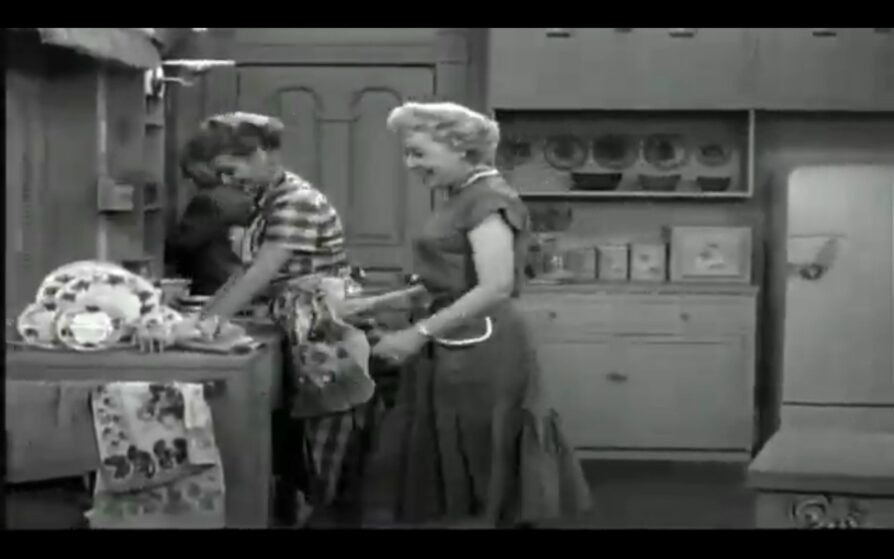By Emily Naser-Hall
On March 31, 1952, American television viewers returned to the 1890s courtesy of Lucy, Ricky, Ethel, and Fred. “Pioneer Women,” the twenty-fifth episode of the first season of I Love Lucy, opens on a pile of freshly washed dishes, then pans to Lucy as she stands over a sink full of soapy water and dirty plates. While the men play cards, Lucy and Ethel continue scrubbing while celebrating a recent social victory—they have applied for membership in the Society Matron’s League. They worry, however, that their rough, red hands—the product of hours of washing dishes—will offend their new high society contacts. After some quick math, which reveals that Lucy has washed 219,000 dishes during her ten years of marriage, the women demand that their husbands spare their hands and buy them electric dishwashers. Ricky and Fred, shocking no one, refuse. “Isn’t it amazing how spoiled modern women are?” Ricky asks. “You got to do a little work and you think it’s terrible.” Lucy and Ethel cry, “A little work?” to which Ricky responds by voicing the chauvinistic logic that underlies one of the most reprinted platitudes of the American midcentury: “Ah, honey, this is the electric age. All you have to do is flip a swish [sic].” The men’s disdain for the modern conveniences that make their wives’ labor less physically taxing motivates the episode’s central conflict—a $50 wager to see whether the men or the women can survive longest without modern technological conveniences.

I Love Lucy often engages with questions of labor, particularly the division of labor along the axis of gender that characterizes postwar cultural narratives about domesticity, economics, and consumption. By focusing primarily on the housewife within the domestic space, midcentury sitcoms like I Love Lucy further entangle labor with affect, such that labor and emotion become interdependent, reinforcing and depending on one another within a complexly gendered matrix. The gendered labor divisions in 1950s American sitcoms constructs affect as labor—what Michael Hardt and Antonio Negri define as “labor that produces or manipulates affects such as a feeling of ease, well-being, satisfaction, excitement, or passion” (2004, 108)—and interrogates the affect of labor. The construction of “labor” as inherently affectless and the depiction of women as emotionally unsuited for the paid workforce reinforce dominant cultural narratives of women’s inherent domesticity. “The 1950s was a decade that invested an enormous amount of cultural capital in the ability to form a family and live out a set of highly structured gender and generational roles,” Lynn Spigel argues (1992, 2). “The transition from wartime to postwar life thus resulted in a set of ideological and social contradictions concerning the construction of gender and the family unit” (1992, 42). The 1950s, then, witnessed the solidification of the nineteenth century “cult of domesticity,” which Jeanne Boydston argues romanticized the home as a moral buffer against modernization with gendered ideologies of labor and housework: “The home, after all, was presumably the antithesis of the economic world. Indeed, the separation of ‘private’ and ‘public’ life—of ‘home’ and ‘work’—had become over the course of the antebellum period one of the most cherished truisms of American culture” (1994, ix-x).
The rhetorical shift from “home work” to “housework” concurrently shifted the affective components of labor, such that the home transformed from the site of work into the object of work. Women working in domestic spaces did not work at home; they worked on home, and on conjuring the home’s attendant emotions of comfort, escape, and nostalgia. The home, then, functions as ground zero for gendered labor norms that rely on an ideological rather than a material organization of daily life. The housewife’s value, according to Mary Beth Haralovich, “was at once central and marginal. She was marginal in that she was positioned within the home, constituting the value of her labor outside the means of production. Yet she was also central to the economy in that her function as a homemaker was the subject of consumer product design and marketing, the basis of an industry” (1989, 61). Her labor could be classified as what Hardt and Negri coin “immaterial,” labor that creates intangible products such as knowledge, information, a relationship, or an emotional response (2004, 108). However, midcentury labor norms would classify the housewife’s work as not only immaterial in the sense that it did not produce tangible goods, but also in the colloquial sense of “immaterial,” in that it didn’t matter. Her job, as Ricky makes crystal clear in the I Love Lucy episode “The Audition,” is defined purely by its care: “I want a wife who’s just a wife. Now all you have to do is clean the house for me, bring me my slippers when I come home at night, cook for me, and be a mama for my children.” Not a huge ask, in Ricky’s mind, because he expects Lucy to do all of this out of love. The love and the personal satisfaction that Lucy should reap from his own happiness should, by Ricky’s logic, not only make the work worth it—it should make Lucy view it as not work at all.

While Ricky’s admonitions make legible cultural constructions that link feminized emotionality to the domestic space, and therefore not to compensable labor, contemporary moralists sought to devalue women’s domesticity as well—and were significantly less shy about their misogyny. To Philip Wylie, crotchety author and all-around misanthrope, women staying at home spelled catastrophe just as much as the specter of women in the workforce. A science fiction novelist and self-styled interpreter of maladies, Wylie penned his nonfiction diatribe Generation of Vipers in 1942 to diagnose the many ills and failings of American society, many of which, to Wylie, rested on the shoulders of women. While the chapter “Common Women” persists as Wylie’s most famous rant—an explicitly woman-hating screed about the laziness and selfishness of the spoiled American mother—he sets the stage for these notorious writings on “momism” in the earlier chapter “A Specimen American Myth.” He chastises American women for designing their lives around a misinterpretation of the Cinderella fairy tale, a story that he himself grossly misreads as actually about the Prince’s search for a wife: “The philosophical notion behind that altogether solid story had nothing to do, really, with Cinderella’s winning of the Prince. He was, in that sense, a mere symbol, as was his wealth….The possibility of finding a worthy Cinderella in that background is the moral” (1942, 45).
Wylie conveniently ignores that Cinderella is fundamentally a story about labor, and slave labor to boot, and instead commends the original Cinderella for her work ethic and service with a smile: “Originally, she had no object whatever but to mind her business and perform her drudgery well. That was the point” (1942, 45). Modern women, however, became inculcated in a distorted fairy tale that conditioned them to expect material wealth simply because they were women, with the home as a center of their disillusionment. “The important factor to us,” Wylie complains, “is Cinderella’s conditioning. It is decidedly not to go on dutifully sweeping the floor and carrying the wood. She is conditioned to get the hell out of those chores” (1942, 46). And getting out of chores is precisely what Lucy and Ethel desire. “Pioneer Women” traces the shift from home work to housework with a healthy dose of cultural hatred for the housewife’s comfort. The couples’ nostalgic reimagining of the late nineteenth century depends upon an understanding of work’s respectability as lying in its difficulty. Ricky adds to his contention that modern women are “spoiled” by arguing that Lucy and Ethel’s grandmothers didn’t enjoy any modern conveniences but nevertheless cleaned the house, made butter, baked bread, and sewed their own clothes. Lucy, however, counters, “Yeah, and where are those women now? Dead.” Advances in home-care appliances and technologies, according to the men who don’t actually perform any housework, have made domestic labor too easy, and therefore not worthy of compensation or of even being considered “labor.”
The division between the paid labor force and unpaid domestic labor further breaks down along the lines of intellect or physicality in the public labor market and affect in the domestic space. Their initial plea for electric dishwashers arises from their fear that the Society Matron’s League will judge them for having to perform physical labor—Ethel bemoans her rough, red skin and Lucy claims that any society husband who kisses her hand will get “dishpan lips.” If, as Wylie claims, “the object of Cinderella is to get into the Social Register” (1942, 45), then Lucy, Ethel, and their electric dishwashers express this link between labor and status in terms of labor’s material effects on the body that performs it. Lucy routinely refuses to portray her own labor as non-physical or solely affective. Her indefatigable energy enables her to perform the labor of multiple bodies to great comedic effect, leaving the viewer with no doubt that domestic labor requires a high level of physical skill. Invoking those mythical grandmothers of yore, Ricky and Fred insist that their wives bake bread and churn butter, home work that the women portray as intensely, hilariously difficult. After churning butter for two hours, Ethel comes to Lucy’s apartment with her hands immovably cramped around the plunger, complaining that “our grandmothers must have had arms like Gorgeous George.” The physicality of Lucy’s bread-baking comprises the episode’s most famous scenes. Lucy’s “happy little loaf” proves the bane of her existence, largely because Lucy mistakenly adds ten extra yeast cakes after misreading the recipe. We see the women’s physical effort with the bread—kneading the dough, shaping the loaf, working together to lift the massive blog into the oven—before we even see the bread itself. And when we do see the bread, it’s attacking Lucy, exploding from the oven and pinning her to the sink, forcing Ethel to cut the loaf with an enormous saw as she attempts to carve Lucy free. The work of making the bread, more than the bread itself, provides the comedic value.
The couples’ foray into economic nostalgia and mandatory domestic labor simultaneously requires increased consumerism, such that the past’s survival in cultural memory depends upon its commodification. Wylie’s criticism of women rests largely on their economic and consumptive authority: “Since money does represent a crystallization of human energy, this gave females an inordinate power” (1942, 47). Wylie’s contempt for women’s consumption and the homemaking technologies they purportedly demand finds a fictional voice in Ricky and Fred, who parrot broader cultural anxieties about the increased spending power of women and the political and social implications of such economic heft. Ricky’s initial objection to Lucy’s request for an automatic dishwasher is financial—his oft-repeated mantra of “I can’t afford it” would make a dangerous drinking game, and “Pioneer Women” is no exception. But in order to recreate the 1890s and inconvenience her husband into losing the bet, Lucy visits a junk shop and buys so much 19th century memorabilia—gas lanterns, a bathtub—that Ricky’s attempt to show Lucy the value of manual labor likely far exceeds what he would have paid for the electric dishwasher in the first place. After Ethel finally manages to churn a small dish of butter, she comments, “Imagine, all that butter and it only cost me $23.75.” Ricky even finds a way to commodify the bet itself by putting on a “gay ‘90s” show at his nightclub and wearing authentic period clothing on the street to advertise it.
If, as George Lipsitz argues, midcentury sitcoms were “charged with special responsibilities for making new economic and social relations credible and legitimate to audiences” (1986, 357), then I Love Lucy taught the women in its audience to be more grateful for their Cinderella-esque good fortune. The wager, to Ricky and Fred, was clearly not about money; Ethel spent almost half the bet’s value on homemade butter and Ricky plans to capitalize on the audience’s nostalgia with his nightclub act. So what’s the point? As with most of Ricky’s plans, the bet served two purposes: to teach Lucy to appreciate how hard she doesn’t have to work and to punish her for the life of leisure he believes she leads. From the repeated reference to hardworking grandmothers to the exaggerated comedy of Lucy’s bread-baking, “Pioneer Women” expresses the value of housework as purely a function of its backbreaking difficulty. Ricky and Fred’s nostalgia for the “gay ‘90s” depends upon cultural constructions of home work’s merit—both in terms of compensation and its classification as work—as grounded in the physical, rather than affective, labor that is expended to accomplish it. For Lucy and Ethel, “humor might have been the women’s weapon and tactic of survival,” as Patricia Mellencamp argues, but “comedy replaced anger, if not rage, with pleasure” (1986, 94). Midcentury domestic sitcoms enabled female spectators to replicate the structural labors and affective denial of their market devaluation through the humor of the female stars, but without the attendant narrative closure, a double bind that Mellencamp refers to as “women’s simulated liberation through comic containment” (1986, 94). Whatever her ideological purpose, the housewife continues to occupy a central position within American cultural capital, her social superpowers both the preservation of an imaginary view of midcentury (or late nineteenth century) idealized gendered labor norms and the socialization of contemporary women to a uniquely affective and labor-unsuited version of American womanhood.
Emily Naser-Hall’s article “Earners and Spenders, Husbands and Wives: The Affective Restraints on Women’s Labor in High Cold War American Sitcoms” is forthcoming in the NRFTS special dossier “Feminist Film and Television Studies Now” (22.1 Spring 2024).
References
Boydston, Jeanne. 1994. Home and Work: Housework, Wages, and the Ideology of Labor in the Early Republic. New York: Oxford University Press.
Haralovich, Mary Beth. 1989. “Sitcoms and Suburbs: Positioning the 1950s Homemaker.” Quarterly Review of Film and Video 11(1): 61-83.
Hardt, Michael and Antonio Negri. 2004. Multitude: War and Democracy in the Age of Empire. New York: The Penguin Press.
Lipsitz, George. 1986. “The Meaning of Memory: Family, Class, and Ethnicity in Early Network Television Programs. “Cultural Anthropology 1(4): 355-387.
Mellencamp, Patricia. 1986. “Situation Comedy, Feminism, and Freud: Discourses of Gracie and Lucy.” In Studies in Entertainment: Critical Approaches to Mass Culture, ed. Tania Modleski, 80-95. Bloomington: Indiana University Press.
Oppenheimer, Jess, Madelyn Davis, and Bob Carroll, Jr., writers. I Love Lucy. Season 1, episode 6, “The Audition.” Directed by Marc Daniels. Aired November 19, 1951, in broadcast syndicate. Paramount Pictures, 2005, DVD.
— — —. I Love Lucy. Season 1, episode 25, “Pioneer Women.” Directed by Marc Daniels. Aired March 31, 1952, in broadcast syndicate. Paramount Pictures, 2005, DVD.
Spigel, Lynn. 1992. Make Room for TV: Television and the Family Ideal in Postwar America. Chicago: University of Chicago Press.
Wylie, Philip. 1942. Generation of Vipers. New York: Rinehart and Company, Inc.

